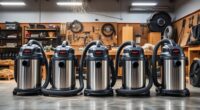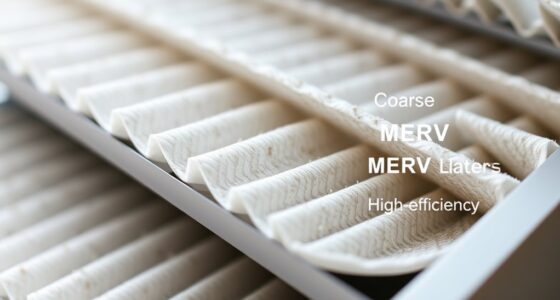To keep your air quality credentials current, you need to stay on top of renewal requirements by earning continuing education credits through workshops, courses, or industry events. Make sure to track your hours and submit renewal applications before deadlines to avoid lapses. Staying qualified demonstrates your commitment to safety, professionalism, and industry standards. If you want to know more about managing your certification renewal process effectively, there’s more to explore below.
Key Takeaways
- Regularly complete required continuing education credits through workshops, online courses, or seminars to maintain certification.
- Track and document all completed activities and hours to ensure compliance and prepare for renewal audits.
- Mark renewal deadlines and set reminders to avoid certification lapse and associated credibility issues.
- Stay informed about specific certification requirements and updates from certifying organizations or state regulations.
- Renew your credentials on time to demonstrate ongoing competence, enhance professional credibility, and support career growth.

Maintaining your certification is an essential part of staying current and competent in your field. When it comes to air quality credentials, the renewal process is a crucial step to ensure you remain qualified and knowledgeable about the latest standards and practices. Typically, this process involves completing a set number of continuing education hours within a specified period. Continuing education keeps you updated on new regulations, emerging technology, and best practices, so you can deliver safe, effective solutions consistently. Staying proactive about your certification renewal shows your commitment to professional growth and helps you maintain credibility with clients and employers.
Maintaining your air quality certification ensures ongoing competence and credibility through continuous education and updates.
The renewal process usually requires you to accumulate a certain number of continuing education credits over a renewal cycle, which can range from one to three years, depending on your certifying body. These credits are earned through various activities such as workshops, online courses, seminars, or conferences related to air quality management. It’s important to track your hours meticulously and keep documentation, like certificates of completion, in case you’re audited. Many certifying organizations also offer or recommend specific courses that count toward your renewal, making it easier to plan your educational activities.
Engaging in continuing education isn’t just about fulfilling requirements—it’s an opportunity to deepen your knowledge and expand your skill set. As the field of air quality management evolves, new challenges and innovations emerge. By staying current through ongoing learning, you can better assess risks, implement effective solutions, and comply with updated regulations. Many organizations now offer online courses, making it convenient to fit learning into your busy schedule. Some certifications might also require you to participate in practical training or to attend industry events, which foster networking and knowledge sharing.
Remember, failing to complete your continuing education and renewal requirements on time can result in a lapse in your certification, which might lead to compliance issues or loss of credibility. To avoid this, mark renewal deadlines on your calendar and set reminders well in advance. Many certifying bodies send renewal notices, but it’s your responsibility to stay organized and proactive. Some organizations also provide resources or assistance to help you identify suitable courses and track your progress. Additionally, being aware of state-specific regulations can help you tailor your continuing education to meet local requirements and optimize your renewal process.
Ultimately, the renewal process is an ongoing commitment to your professional integrity and growth. By staying engaged in continuing education, you demonstrate your dedication to maintaining high standards and ensuring your skills are sharp. This not only benefits your career but also enhances the quality of service you provide to clients and the safety of the environments you help manage. Staying current through certification maintenance is an investment in your expertise, confidence, and long-term success in the air quality field.
Frequently Asked Questions
How Often Must I Renew My Air Quality Certification?
You need to renew your air quality certification every three years to avoid certification expiration. The renewal process involves completing the required continuing education credits and submitting any necessary documentation. Staying current with these requirements guarantees your credentials remain valid and you can continue working in the field. Be proactive by tracking your renewal deadlines and fulfilling the renewal process on time to maintain your professional standing and avoid lapses.
Are There Online Options for Certification Maintenance?
Yes, you can maintain your air quality certification through online options. Many organizations offer virtual courses and online modules that let you complete your certification maintenance conveniently from home. These digital formats often include interactive lessons, quizzes, and certifications upon completion. Check with your certifying body to find approved online programs, ensuring you meet renewal requirements while saving time and avoiding travel.
What Types of Activities Qualify for Maintenance Credits?
You might think only formal courses qualify for maintenance credits, but industry standards recognize a variety of activities. Attending conferences, webinars, or completing online courses all count toward your certification credits. To guarantee proper credit calculation, keep detailed records of your activities. Engaging in research, volunteering, or publishing articles can also qualify, helping you stay current and demonstrating your ongoing commitment to industry standards.
Can I Carry Over Unused Maintenance Credits?
Yes, you can carry over unused maintenance credits, but only if they comply with the credit transfer policies and are submitted before your renewal deadlines. Make sure to document and verify the transfer, as failing to do so may affect your certification renewal. Staying proactive ensures your credits remain valid and your credentials stay current, avoiding the need for retaking exams or additional training.
What Are the Consequences of Failing to Maintain Certification?
If you fail to maintain your certification, you risk certification penalties and credential suspension, which can halt your work and credibility. You might also need to complete additional training or reapply for certification, costing you time and money. To avoid these issues, stay current with your maintenance requirements, submit credits on time, and keep detailed records. Failing to do so puts your professional reputation at risk and limits your opportunities.
Conclusion
Staying on top of your air quality certification is like tending a garden; regular care keeps it thriving and vibrant. By maintaining your credentials, you ensure your expertise remains sharp and your reputation strong. Don’t let your qualifications wither away—nurture them with ongoing education and renewal. Think of certification maintenance as watering your professional growth, helping you stay fresh and ready to tackle new challenges with confidence. Keep your credentials current, and watch your career flourish.









